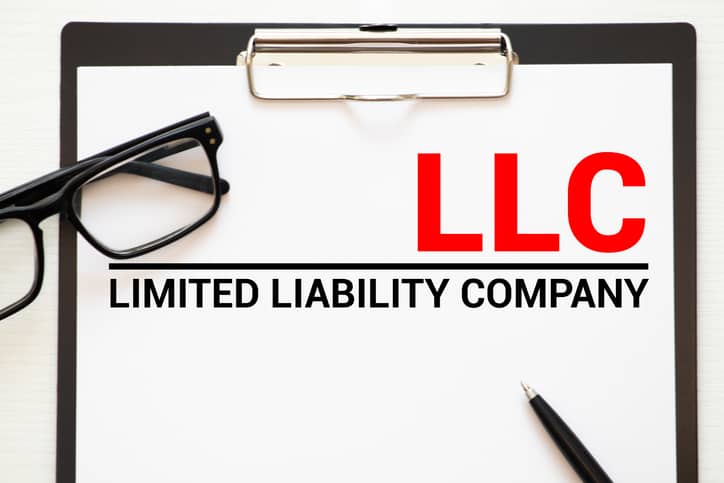A limited liability company (LLC) is a corporate structure that offers an owner legal protection. The business structure combines the pass-through taxation of a sole proprietorship or a partnership with the limited liability of a corporation. An LLC is not a corporation but a separate and distinct legal form of a company that limits the legal and financial exposure of its owners.
Before choosing this business structure, owners should understand the requirements to form an LLC as well as the pros and cons.
How to Form an LLC
An LLC structure offers a straightforward way to set up a new business. It’s governed by state rules, so it’s important for owners to research in the state where they plan to launch their new venture. While the rules vary, states might require owners to:
- Select a business name.
- Name a registered agent who will receive all paperwork related to the LLC.
- File articles of organization.
- Obtain an employer identification number (EIN) from the federal government.
- File an annual report with the state on profits and losses.
Some states place further requirements on owners. For example, in New York, an LLC must keep on file a written operating agreement that details the rights, duties, liabilities, and obligations of all LLC owners. Also, within 120 days after articles of organization become effective, New York LLCs must publish in two newspapers a notice related to the formation of the LLC.
Fees vary by state. For the four most populous states, the fees are as follows:
California: The secretary of state’s office charges a $70 filing fee for the paperwork to form an LLC. Name reservations cost $10, and filing the required biennial reports costs $20.
Texas: The secretary of state’s office charges a $300 filing fee, plus a 2.7% credit card convenience fee to file an LLC Certificate of Formation. Name reservation or renewal costs $40.
Florida: The state Division of Corporations charges $125 to file the articles of organization for an LLC. Name reservation costs $25.
New York: The New York Department of State charges a $200 fee to file the articles of organization for an LLC. In addition, the cost of publication in New York varies according to the county in which the LLC publishes, but costs range from $150 to $200. Name reservation costs $20.
What Are the Requirements to Form an LLC?
State laws designate each owner of an LLC as a “member.” One person can form an LLC (called a single-member LLC), or it can have many owners. Most states do not restrict who can own an LLC. Members can include individuals, corporations, other LLCs, and foreign entities.
Some types of banks and insurance companies cannot form an LLC. Also, LLCs with a member who is not a U.S. citizen must follow special rules. Otherwise, the LLC structure provides a simple way to set up most companies, especially a small business. It’s also easy to move the location of the LLC. Although there may be tax consequences associated with a move, an owner who forms an LLC in Texas can move it to Florida, for instance, simply by filing the proper paperwork.
What Are the Advantages of an LLC?
An LLC provides personal asset protection for owners. Anyone who takes legal action against the LLC, including creditors, cannot seek to collect anything from personal bank accounts, a personal car, or a person’s home. Only business-related accounts are vulnerable.
Another advantage is the simplicity of setting up an LLC. Setup does not require formation of a board of directors or designation of officers (it does with a corporation, for example). LLCs also do not require the administrative responsibilities that incorporation requires.
How Is an LLC Taxed?
Taxes are another area where an LLC offers flexibility. A single-member LLC pays what is called “pass-through” taxes, meaning that income from the business is reported on the owner’s personal income taxes. Owners first calculate the net profit of the business and report that on their tax return as income. Owners also are responsible for self-employment taxes for Social Security and Medicare.
However, LLC owners can choose to be taxed as an S corporation, which may reduce self-employment taxes, or as a C corporation, which allows for all business profits to be taxed at the corporate tax rate, according to the IRS. These options can provide significant advantages depending on the size of the business.
What Are the Disadvantages of an LLC?
Most states require owners to pay a fee to form an LLC, and also to pay taxes on profits. In many states, the tax rate is low. But in some states, annual taxes could reach $800 or more.
Also, an LLC is not the best business structure for those seeking funding from outside investors, such as venture capitalists. Investors typically will only fund corporations because the organization provides them a better return on their investment, particularly in the form of stocks issued in exchange for invested money.
What Is the History of Limited Liability Companies?
In 1977, Wyoming became the first state to offer the LLC structure. Other states soon followed. Since then, many well-known companies have started as or switched to an LLC business structure. For example, Google switched to an LLC when parent corporation Alphabet was formed. Berkshire Hathaway (founded by famous investor Warren Buffet), Amazon, and Chrysler also operate as LLCs.
